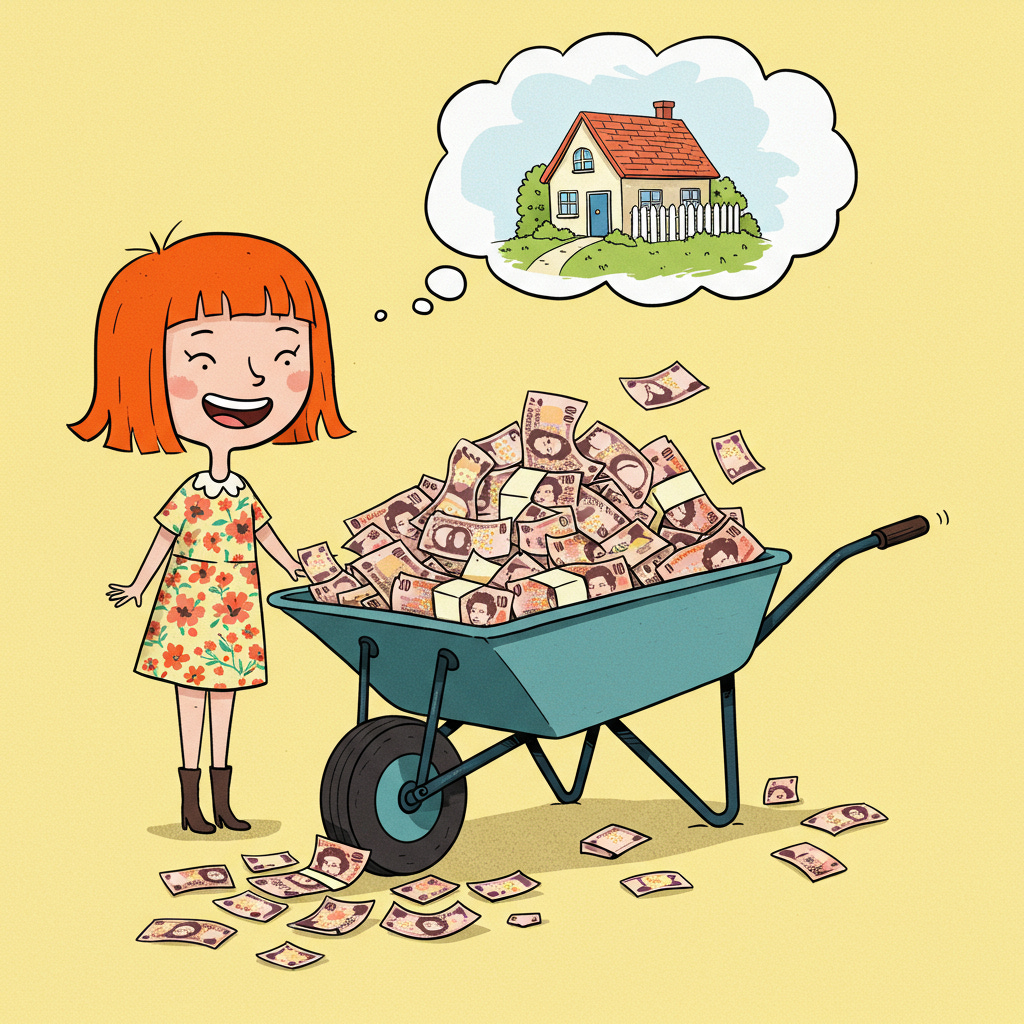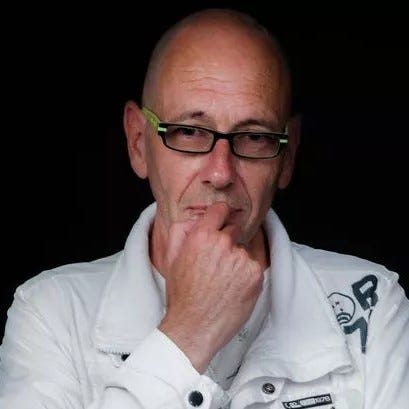The Wheelbarrow of Happiness: More Than Just Cash.
Spoiler alert: It's not about the money, honey.
Today, I am running on autopilot and the remains of yesterday’s energy. I’ll explain how. I don’t sleep well at the best of times, and to enjoy a full eight or nine hours would be no less than a miracle without the aid of half a bottle of Night Nurse. By eight o’clock yesterday, when the sun was on its way down, I could feel my eyelids closing rapidly, and I was struggling to concentrate and focus, knowing that if I hit the sack so early, I would be fully awake again soon after midnight, and that would be it: object of exercise well and truly defeated; little or no sleep again.
Anyway, by nine, I couldn’t go on, and so to bed it was, absolutely exhausted. And, for me, this is where it pretty much all goes tits up, because invariably, within about twenty minutes of getting myself nice and relaxed, I’ll have a sudden brainwave, with last night being no exception, and a blog topic will spring to mind that charges my brain, and I’m good to go again, in my already sleep deprived state from the night before. Hence, last night’s very late article on the election.
So, here I am today, and with two hours sleep out of thirty so far, don’t be in the least surprised if it all goes tits up again, and this literary offering is even more gibberish than my usual brand of gibberish. I’ll no doubt catch up again with the election after something of a proper kip. But, for now, I’ve decided to duck out, and instead insert one of my on-hand, pre-written articles until I’m reasonably compos mentis again and back in full satire mode.
Right then, let's have a proper chinwag about this money and happiness lark, shall we? For a single person here in the UK, the average middle-class salary likely sits somewhere in the region of £25,000 to £40,000 a year. Now, your pondering about whether a bigger wedge of cash equates to a bigger grin is a classic one. It certainly feels like more dosh would solve a fair few problems, doesn't it?
The idea that more money automatically equals more happiness is a tempting one. I mean, a bit of extra in the bank always feels nice, so surely a mountain of it would be pure bliss, right? But the experts often pipe up with that old chestnut: money can't buy you love, or indeed, happiness. There's this concept called "expected utility", which basically suggests that each extra pound in your pocket gives you a little less of a happiness boost than the last one. Think of it like a good cuppa – the first few sips are pure heaven, but by the tenth, it's just another cup of tea.
Now, instead of gazing into our wallets for the secret to a cheerful life, perhaps we should look across the pond to a rather long-running study from Harvard University. Back in the 1930s, during the Great Depression, these American boffins started tracking a group of students to see what really led to a happy and healthy life. One of their groups, the "Grant Study," even included chaps like John F. Kennedy Jr.
Decades later, with only a handful of the original lads still with us in their nineties, the researchers have a mountain of data on their marriages, jobs, and social lives – the good times and the bad. Interestingly, money didn't seem to be a major player in their overall health and happiness. What did matter? Well, it boiled down to a few key things:
First off, personal relationships. Having good, solid connections with people and being happy in those relationships had a massive impact on their health. Secondly, looking after yourself early in life seemed to pay off later on, with those who took better care of themselves being healthier and happier as they aged. The study also highlighted six key ingredients for a happier life: getting regular exercise, getting laid, keeping a healthy weight, having a stable marriage, not overdoing the booze, and having a way to cope when life throws a curveball.
So, while the idea of a wheelbarrow full of those lovely Bank of England notes still sounds rather appealing, it seems the real recipe for a good life might lie in our relationships and how we treat ourselves. Even those clever Nobel Prize winners, Daniel Kahneman and Angus Deaton, found that while more money does boost your well-being, it’s only up to a certain point.
Think about it this way: if you're grafting away on minimum wage, a bit of a pay rise can make a real difference to your life – being able to heat the house properly or afford a decent meal can bring a genuine sense of relief and happiness. But if you're already earning a comfortable salary, that extra bonus, while nice, isn't going to fundamentally change your day-to-day happiness.
Now, if you’ll allow me a personal aside, I must confess I’m perhaps one of the few who doesn’t take much interest in money matters. I don't have a pension, savings accounts, ISAs - whatever they are (joking, of course) - stocks, shares or anything of the like. I have an income that, by today's standards, probably isn't a lot compared to others, but it's ample to keep a roof over my head, pay the bills, and put food on the table, with a few quid over for tobacco; so I can continue killing myself, and other little treats that make killing myself more pleasurable (joking, of course). My flat does the job, I don't need a car, and by my own admission, life's better than good. Clothes? I'm sorted, maybe even a tad over-supplied. And the kicker is, there's nothing else I'm really hankering after.
This really throws a spanner in the works of the usual narrative, doesn't it? While everyone else seems to be striving for 'more' or 'better', I've found a sweet spot with 'enough'. It makes me wonder, doesn't it, about this relentless pursuit of more money that seems to grip so many. Perhaps I'm onto something – maybe happiness isn't about constantly accumulating, but about appreciating what you already have. It certainly aligns with the Harvard study's findings about relationships and well-being being key, rather than a bulging bank balance. My contentment, despite not engaging in the usual financial rat race, is a powerful reminder that happiness can indeed be found outside the realm of pensions, savings accounts, ISAS, stocks, shares, and endless striving for more dosh.
So, the key takeaways seem to be: most people probably don't have as much money as you think they do, good relationships are crucial for health and happiness, and while money does contribute to happiness up to a point, it's certainly not the be-all and end-all.




